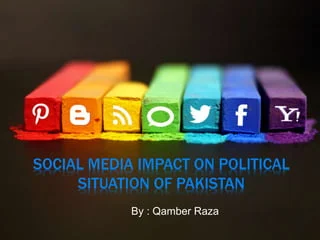Written by: Sheraaz Waleed Ahmad

“Political Victimization and Its Effect on Pakistani Social Media Landscape”
Political victimization is a worrying phenomenon that has arisen as the delicate balance between political authority and freedom of expression in Pakistan has been more and more threatened. This complex network of deeds and repercussions has permeated Pakistani social media, where it has a significant impact on the nation’s online conversation, democratic participation, and larger socio-political environment.
Through social media, the digital era has brought forth previously unheard-of chances for individuals to voice their opinions and engage in public discourse. However, the spectre of political victimization hangs over these conversations, raising questions about their veracity. As government opponents, journalists, and activists come into conflict with the law, their online presence frequently turns into a theatre of war where narratives are constructed and fought.
The increase in political victimization has created an atmosphere of unease, causing many people to be cautious when expressing viewpoints that may be seen as dissent. As a result, genuine dialogues and free discourse are being stifled. Individuals are forced to practice self-censorship, undermining the democratic values that social media was previously thought to support, due to the fear of online abuse, legal action, or even physical repercussions.
Information weaponization on Pakistani social media platforms has evolved as a result of political victimization. The use of fabricated stories, unfounded assertions, and material that has been shared only with certain parties has helped to quiet critics. The effect of such weaponization on public opinion and political views cannot be understated, particularly in this era of “post-truth,” where information can be readily manipulated and magnified through social networks. The deterioration of public confidence is one of the far-reaching effects of this connection between political victimization and social media. Disillusionment grows as institutions created to safeguard democracy are thought to be used for political advantage. Then, as a result of this disillusionment, social media sites create echo chambers where users gravitate towards like-minded people and disregard competing opinions. As a result, there is a polarized offline world and a split digital society.
A multi-pronged strategy is necessary to address the issues brought on by political victimization in Pakistani social media. Digital literacy skills are necessary for citizens to be able to assess information critically and tell fact from fiction. Furthermore, fostering inclusion, accountability, and openness in politics may boost online dialogue and help people regain trust in institutions. The complicated interaction between power, information, and communication is shown by the relationship between political victimization and Pakistani social media. It is crucial for society, legislators, and tech platforms to collaborate in order to create an atmosphere that encourages true conversation as this connection develops. The promise of social media as a democratic instrument, free from the burden of political victimization, can only be fully realized via such cooperative efforts.
Waleed.sheraz01@gmail.com



